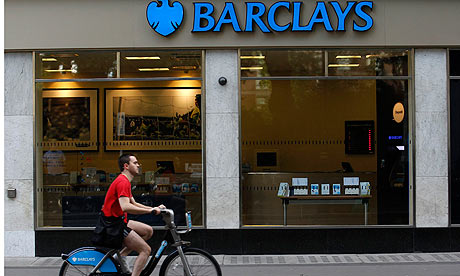Shares in Royal Bank of Scotland and Barclays slip as analysts predict that Ireland will need help from EU or IMF British banks were caught in mounting anxiety over Ireland today as the country admitted that the rapid rise of its borrowing costs was "very serious". With Ireland's long-term borrowing rates surging through a record-breaking 9%, City analysts said it could only be a matter of time before Ireland would need help from the EU or International Monetary Fund, as Greece did six months ago. Shares in Royal Bank of Scotland and Barclays fell. RBS was down almost 3% to 41p – giving taxpayers a loss of more than £9bn on their 84% stake. The banking sector holds most of the Irish debt, and the two main Irish banks, Allied Irish Bank and Bank of Ireland, suffered share price falls of 6% and 7% respectively. Dealers were also closely watching the price of buying insurance against the two banks defaulting – known as credit default swaps – which rocketed to new highs yesterday. Such high levels will be a concern to other banks trying to trade with AIB and there was speculation tonight that it was becoming harder for Irish banks to obtain overnight funding from rivals. AIB, expected to become more than 90% government-owned after a cash call of about €5bn (£4.2bn) in the coming weeks, was hardest hit. It now costs €90,000 to insure €1m of the bank's debt. Ireland's finance minister Brian Lenihan, who has seen his country's borrowing costs rise from 6% to 9% in three weeks, said: "The bond spreads are very serious and there is international concern throughout the eurozone about that." Steven Major, a strategist at HSBC, said: "When you get to these levels, it normally implies there is going to be an 'event'." Even though Ireland does not technically need to return to the bond markets until summer 2011, bond holders are expressing concerns now. A Reuters poll of economists and bond strategists showed that 20 out of 30 respondents thought it was unlikely that the country would make it through 2011 without outside help. European commission president José Manuel Barroso had tried to calm the markets. But his remarks were not enough to stop the cost of insuring Irish, Spanish and Portuguese government debt against default hitting record highs. A euro-wide crisis is precisely what Barroso is trying to avoid. "What is important to know is that we have all the necessary instruments in place now to support Ireland if necessary," Barroso said. "We are monitoring the situation closely," he continued, adding that "we support the efforts of the Irish authorities". Ireland was one of the first debt-laden eurozone countries to embark on severe public spending cuts and tax rises, but it is struggling to convince the markets that its plan to slash its deficit by €15bn by 2014 is achievable. Some analysts think more can be done. Jacques Cailloux, chief eurozone economist at RBS, noted that €2trn of debt exposure to Greek, Spanish, Portuguese and Irish bonds is held out side those countries. "If that is not enough to worry about financial contagion what is?" he said.British banks hit by Irish financial crisis

Saturday, 13 November 2010
Posted by
Britannia Radio
at
12:49
![]()





















